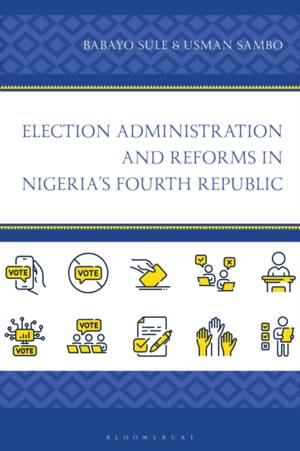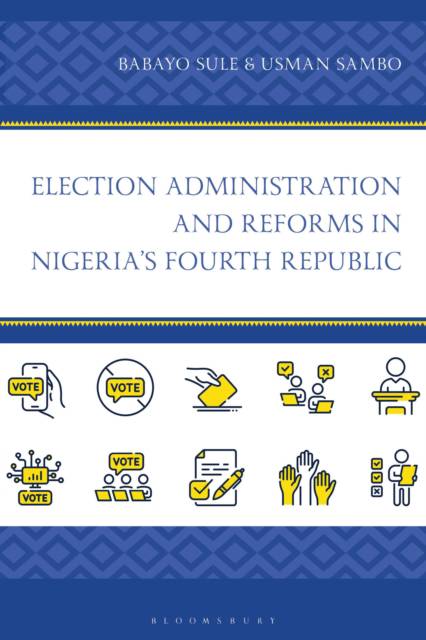
- Afhalen na 1 uur in een winkel met voorraad
- Gratis thuislevering in België vanaf € 30
- Ruim aanbod met 7 miljoen producten
- Afhalen na 1 uur in een winkel met voorraad
- Gratis thuislevering in België vanaf € 30
- Ruim aanbod met 7 miljoen producten
Zoeken
€ 203,95
+ 407 punten
Omschrijving
Babayo Sule and Usman Sambo analyse the recent Nigerian election reforms and their impact on the outcome of elections.
This book provides a comprehensive analysis of electoral administration in the Fourth Republic of Nigeria (1999-present day) and its regulatory, institutional, and procedural reforms. These reforms will not only be examined in their basic framework, but will also be observed for their credibility, integrity and transparency. This book focuses on how these reforms were developed and how they work. Sule and Sambo argue for fundamental changes in the administration of elections in Nigeria, including the introduction of electronic processes such as the Smart Card Readers in 2015 and Bimodal Verification Accreditation Systems in the 2023 General Elections that have positively impacted the electoral process and integrity, without forgetting the antecedents of the numerous challenges faced during the period. They examine not only technological changes but also constitutional reforms, procedural reforms, and institutional reforms. Introducing a new dimension to the study of elections, the authors provide a clear picture of the roles of all the actors involved, the challenges they faced, the factors that enhanced integrity and credibility and the daunting challenges that continue to affect the success of the elections. Thus, this book presents practical measures and policy implications for an improved process in future elections in Nigeria.
This book provides a comprehensive analysis of electoral administration in the Fourth Republic of Nigeria (1999-present day) and its regulatory, institutional, and procedural reforms. These reforms will not only be examined in their basic framework, but will also be observed for their credibility, integrity and transparency. This book focuses on how these reforms were developed and how they work. Sule and Sambo argue for fundamental changes in the administration of elections in Nigeria, including the introduction of electronic processes such as the Smart Card Readers in 2015 and Bimodal Verification Accreditation Systems in the 2023 General Elections that have positively impacted the electoral process and integrity, without forgetting the antecedents of the numerous challenges faced during the period. They examine not only technological changes but also constitutional reforms, procedural reforms, and institutional reforms. Introducing a new dimension to the study of elections, the authors provide a clear picture of the roles of all the actors involved, the challenges they faced, the factors that enhanced integrity and credibility and the daunting challenges that continue to affect the success of the elections. Thus, this book presents practical measures and policy implications for an improved process in future elections in Nigeria.
Specificaties
Betrokkenen
- Auteur(s):
- Uitgeverij:
Inhoud
- Aantal bladzijden:
- 224
- Taal:
- Engels
- Reeks:
Eigenschappen
- Productcode (EAN):
- 9781666974515
- Verschijningsdatum:
- 11/12/2025
- Uitvoering:
- Hardcover
- Formaat:
- Genaaid
- Afmetingen:
- 152 mm x 229 mm
- Gewicht:
- 462 g

Alleen bij Standaard Boekhandel
+ 407 punten op je klantenkaart van Standaard Boekhandel
Beoordelingen
We publiceren alleen reviews die voldoen aan de voorwaarden voor reviews. Bekijk onze voorwaarden voor reviews.







